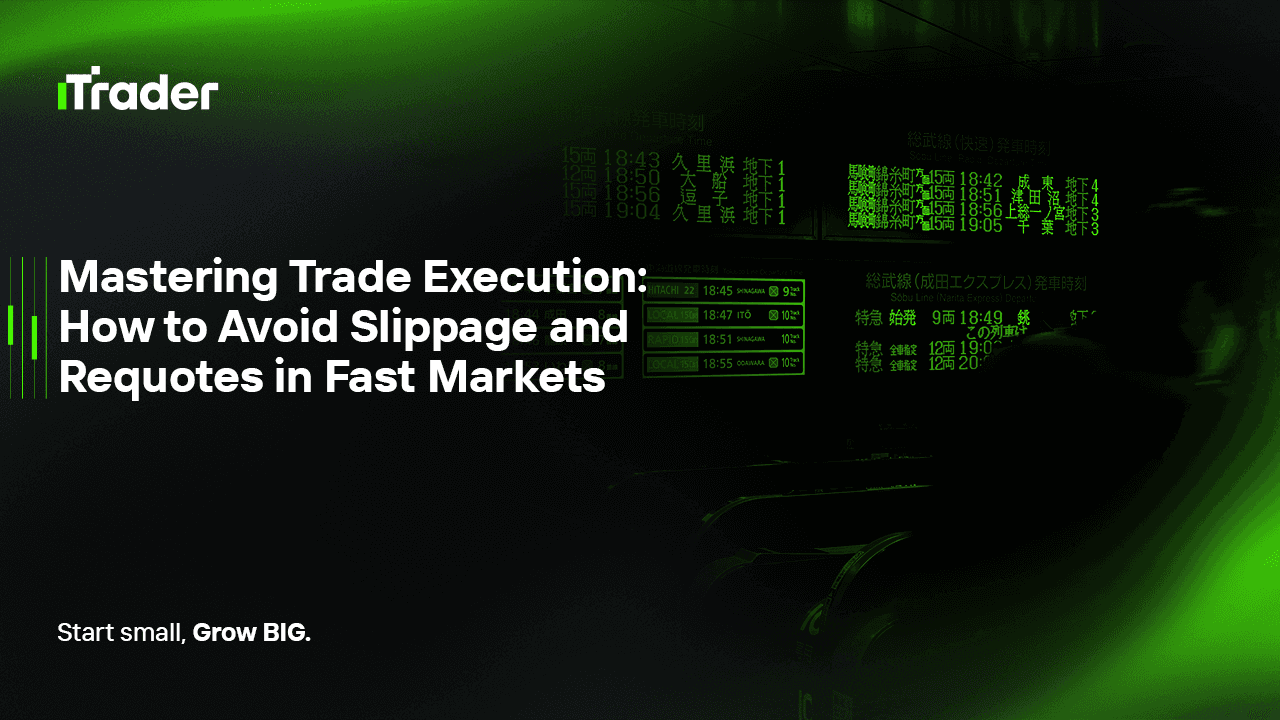2025-09-22
Every trader knows the feeling: you spot the setup, hit the buy button, and then… your entry isn’t where you expected. The market moved a little, your broker slipped the order, or worse—they sent you a requote. Suddenly your risk looks bigger, your reward-to-risk ratio is skewed, and frustration creeps in.
For retail traders this might be an annoyance, but for prop traders it’s a different story. Slippage and requotes can be the difference between passing or failing an evaluation. When a firm sets strict drawdown rules, even small execution errors matter.

In this blog, we’ll break down what slippage and requotes really are, why they hit prop traders harder, and what you can actually do to manage them. Think of it as a trader-to-trader conversation about one of the least glamorous but most important parts of the game: getting filled at the right price.
Execution isn’t just clicking “Buy” or “Sell.” It’s the whole chain:
Along that chain, two things can happen:
If you’ve ever traded around big news events, you’ve definitely seen one—or both.
Slippage is simply the gap between your intended price and your actual fill.
Example: You buy EUR/USD at 1.1000. Instead of 1.1000, you get filled at 1.1003. That’s a 3-pip slippage against you.
A requote is when your broker says: “Sorry, we can’t fill you at that price. Here’s a new one—do you want it?”
Example: You try to buy GBP/USD at 1.2500. The broker responds: “New available price: 1.2505.” You must accept or cancel.
Requotes are most common with dealing desk brokers, especially when markets are moving fast. They’re frustrating because they interrupt your flow—you either chase the market or miss the trade.
For a retail trader, slippage and requotes just eat into profit margins. For a prop trader, they can break the rules of the game.
That’s why execution quality is part of being a professional. Strategy alone isn’t enough.
Here’s the truth: you’ll never fully escape slippage. It’s part of trading. What matters is how you prepare for it and respond when it happens.
The traders who survive in prop aren’t the ones with zero slippage—they’re the ones who accept it and keep their discipline intact.
Execution isn’t just a technical detail—it’s part of risk management.
Picture this: it’s Nonfarm Payroll Friday. Your system calls for a breakout buy at 1.0800 in EUR/USD.
For many traders, this kind of slippage is enough to break a prop evaluation. The smart play? Sit out unless your system is specifically designed for that chaos.
Good traders measure everything—including execution.
Execution data is part of your trading edge. Ignore it, and you’re trading blind.
Slippage and requotes aren’t glamorous topics. They don’t show up in flashy strategy backtests. But for prop traders, they’re deal-makers or deal-breakers.
You can’t eliminate them, but you can manage them. The keys are:
Prop firms don’t expect perfection—they expect professionalism. Managing execution is part of proving you’re ready to handle real capital.
© 2025 iTrader Global Limited | 회사 등록번호: 15962
iTrader Global Limited는 코모로 연방 앙주앙 자치섬의 무잠두(Hamchako, Mutsamudu)에 위치하고 있으며, 코모로 증권위원회(Securities Commission of the Comoros)의 인가 및 규제를 받고 있습니다. 당사의 라이선스 번호는 L15962/ITGL입니다.
iTrader Global Limited는 “iTrader”라는 상호로 운영되며, 외환 거래 활동에 대한 인가를 받았습니다. 회사의 로고, 상표 및 웹사이트는 iTrader Global Limited의 독점 재산입니다.
iTrader Global Limited의 다른 자회사로는 iTrader Global Pty Ltd가 있으며, 이 회사는 호주 회사 등록번호(ACN): 686 857 198을 보유하고 있습니다. 해당 회사는 Opheleo Holdings Pty Ltd의 공식 대리인(AFS 대표 번호: 001315037)이며, Opheleo Holdings Pty Ltd는 호주 금융서비스 라이선스(AFSL 번호: 000224485)를 보유하고 있습니다. 등록 주소는 Level 1, 256 Rundle St, Adelaide, SA 5000입니다.
면책 조항: 이 회사는 본 웹사이트에서 거래되는 금융 상품의 발행인이 아니며 이에 대해 책임을 지지 않습니다.
위험 고지: 차액결제거래(CFD)는 레버리지로 인해 자본 손실이 빠르게 발생할 수 있는 높은 위험을 수반하며, 모든 사용자에게 적합하지 않을 수 있습니다.
펀드, CFD 및 기타 고레버리지 상품의 거래에는 전문적인 지식이 요구됩니다.
연구 결과에 따르면 레버리지 거래자의 84.01%가 손실을 경험하고 있습니다. 거래에 참여하기 전에 관련 위험을 충분히 이해하고 전체 자본을 잃을 준비가 되어 있는지 확인하십시오.
iTrader는 레버리지 거래로 인해 발생하는 손실, 위험 또는 기타 피해에 대해 개인 또는 법인에게 전적인 책임을 지지 않음을 명시합니다.
이용 제한: iTrader는 해당 활동이 법률, 규제 또는 정책에 따라 금지된 국가의 거주자를 대상으로 본 웹사이트나 서비스를 제공하지 않습니다.